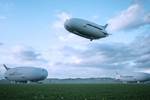Exel pull-wound composites to enable Flying Whales airship design
State-of-the-art VTOL rigid airship, to take 80 kilometers of thin-wall carbon fiber tubes, will function like an airborne crane for transporting cargo in remote areas.
Exel Composites (Vantaa, Finland) is collaborating with French airship manufacturer and operator Flying Whales (Suresne) to develop thin-wall carbon fiber tubes for a state-of-the-art rigid airship. The airship will deliver up to 60 tons of cargo to remote and difficult-to-reach locations globally. This will also cut emissions compared to land- and air transportation. Exel will provide R&D support during the airship’s rigid structure prototyping phase, developing and manufacturing the estimated 80 kilometers of carbon fiber tubing needed to make this concept a reality.
Flying Whales is the designer of the LCA60T, a 200-meter-long vertical takeoff and landing (VTOL) airship that uses helium lifting technology to lift its weight and cargo capacity. The airship will function like an airborne crane, carrying the cargo and transporting it to the customer, reducing the reliance on air and land transport and unlocking bottlenecks at shipping ports.
The airship could be used to transport trees when transporting lumber, wind turbine blades to utility stations and an entire portable hospital, aiming to bring universal healthcare to some of the world’s most remote areas.
“With this airship being one of the largest ever developed, the frame needs to be able to distribute the structure’s entire load,” Guillaume Klein, business development manager at Exel Composites, explains. “We are working closely with Flying Whales to develop a unique tube that meets the technical requirements and specifications needed to make this project viable. Most aerospace standards don’t cover airships yet, instead focusing on planes and helicopters.”
According to Flying Whales, Exel provided both of its needs — a large volume of pull-wound carbon fiber tubes and an R&D partner with an understanding of aerospace standards and applications — to bring the airship to life (see video below).
“Each airship requires 80 kilometers of pull-wound carbon fiber tubes,” Klein continues. “Pull-winding is ideal for these applications as it allows extra reinforcements to be added to the tubes compared to other techniques. Furthermore, being a continuous manufacturing process, it allows us to produce the large volumes of tubes needed for this project while maintaining quality, stability and uniformity.”
For related content, read “Next-generation airship design enabled by modern composites.”
Related Content
-
TPI manufactures all-composite Kenworth SuperTruck 2 cab
Class 8 diesel truck, now with a 20% lighter cab, achieves 136% freight efficiency improvement.
-
TU Munich develops cuboidal conformable tanks using carbon fiber composites for increased hydrogen storage
Flat tank enabling standard platform for BEV and FCEV uses thermoplastic and thermoset composites, overwrapped skeleton design in pursuit of 25% more H2 storage.
-
Sinonus launches energy-storing carbon fiber
Swedish deep-tech startup Sinonus is launching an energy-storing composite material to produce efficient structural batteries, IoT devices, drones, computers, larger vehicles and airplanes.















.jpg;maxWidth=300;quality=90)
